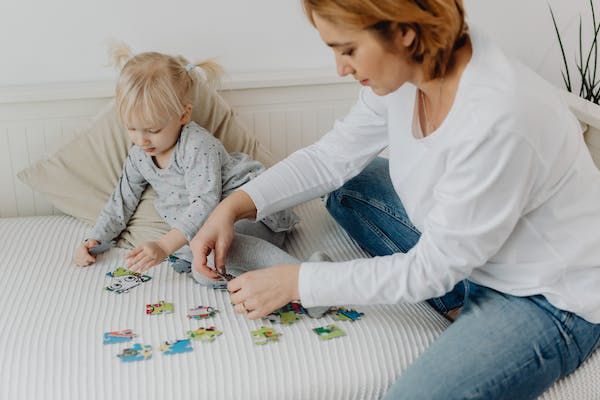Preschoolers are full of energy and eager to learn new things. Children develop at different rates and reach milestones in their own time as they explore and interact with others. Child development can be categorized into four areas: cognitive, physical, emotional, and social. According to Raising Children the cognitive development of a preschool child includes their ability to think, understand, communicate, remember, imagine and work out what might happen next.
Preschool children learn best through play. When a child plays with adults or other children they are gaining language and communication skills. Participating in a variety of activities offers a child the chance to develop physical motor skills for both gross motor and fine motor tasks. Through play, they are also experimenting, thinking, and problem-solving.
10 Activities Your Preschooler Should Do Every Day
We have a list of easy activities to nurture your preschooler's cognitive development.
12 Read Books
Reading offers countless benefits to children, and it is a bonding activity for families. While you are reading with your child, they are gaining speech and language skills, thinking skills, and learning about new topics. Reading is an engaging way to work on your preschooler's attention span also. A trip to the local library is a great way to find new stories on topics your child may be excited about. They will enjoy listening to and looking at both fiction and non-fiction picture books.
11 Play Outside
Children need time to explore and move their bodies. In fact, playing outside is good for all four areas of development! You can try these activities with your preschooler the next time you're playing outside:
- Hopscotch
- Nature walk
- Scavenger hunt
- Hide and go seek
- Bubbles
- Create shadows
10 Build & Stack Things
Preschool children learn as they build and stack with Legos, blocks, boxes, cups, or plastic containers. They are working on their hand-eye coordination, problem-solving skills, and creativity. You can enhance the play by making comments or asking questions as your child builds!
9 Imaginative Play
Children like to imitate adults and to pretend play. They will do this naturally and can be very creative in their play. Imaginative play can be done with a variety of toys or household items. A few toy ideas to get your preschooler engaged in play include:
- Dress up clothes
- Toy phone
- Baby doll
- Shopping cart
- Toy food
- Doctor tools
- Cash register
8 Sensory Play
Sensory play gives children an opportunity to explore with their five senses. Sensory bins can be filled with dry pasta, rice, sand, water, beans, hay, and so many more options. Provide some scoops, measuring spoons, or small cups and your preschooler will be excited to play!
7 Explore With Art
Art projects give preschool children a chance to be creative, work fine motor muscles, learn cause and effect, and practice critical thinking skills. You can vary the art supplies and let your child take the lead in creating their own artwork. The value is in the process, not necessarily the final product.
6 Play With Play-Doh
Although Play-Doh can be messy, it stretches children's imagination and works their fine motor muscles. Given a few Play-Doh tools, children can express their creativity as they play with their parents or independently. Play-Doh can also be a fun way to practice foundational skills, like building letters, making shapes, or naming colors.
5 Bake Or Cook
Baking or cooking in the kitchen with mom is a special experience for your preschooler. As you work in the kitchen, give your child 1-2 step directions to follow. Children benefit from hands-on experiences that teach math skills, such as measurement, counting, and sequencing.
4 Play Games
Playing simple games is a great activity to get the family involved in. Preschoolers can practice their emerging turn-taking and listening skills. Games such as memory match, Go Fish, Chutes and Ladders, Simon Says, and Candy Land will be fun options to nourish your child's cognitive development.
3 Music & Movement
Kids at this age love to sing and dance! Preschool children love songs about anything, so don't be afraid to make up silly songs. You can bring out toy musical instruments or make your own (think pots and pans for drums). Fingerplays, nursery rhymes, and songs are filled with educational concepts. You are likely familiar with songs that work on skills such as counting, letters, animals, naming body parts, rhyming, following directions, and more. This list of 25 popular nursery rhyme songs from Little Learning Corner has lyrics to familiar favorites and maybe some new ones to try.
2 Count & Sort At Meal Time
Snacks and meals offer a natural way to talk and practice early math skills. The next time you sit down at the dinner table try to include one of these ideas:
- Sort food by color
- Count the amounts one-by-one
- Make patterns
- Notice the shape of different foods
- Talk about sizes
1 Puzzles
Puzzles are a fun learning tool to keep little hands busy. They strengthen a preschooler's cognitive skills, such as spatial awareness, memory skills, shape recognition, and visual perception. Knob puzzles, peg puzzles, and jigsaw puzzles are all great options for preschoolers. Per Fun-A-Day, you can also make a name puzzle by writing the letters of their name on paper and cutting it apart.
Sources: Fun-A-Day, Little Learning Corner, Raising Children




.jpg)







